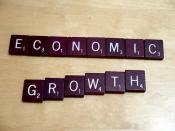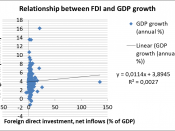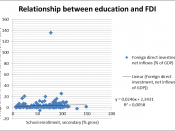Foreign direct investment (FDI) and Economic growth
Table of Contents:
Chapter 1 1.1 Introduction 1.2 Literature review
Chapter 2 2.1 Research question 2.2 Hypothesis
Chapter 3 3.1 Outline of data and variables to be studied 3.2 Data analysis 3.3 Conclusion
References
1.1 Introduction
Over the past two decades, many countries around the world have experienced substantial growth in their economies, with even faster growth in international transactions, especially in the form of foreign direct investment (FDI). The share of net FDI in world GDP has grown five-fold through the eighties and the nineties, making the causes and consequences of FDI and economic growth a subject of ever-growing interest . In this paper, we study the relationship between FDI and economic growth.. Foreign direct investment (FDI) are often to be said have the direct influence on the GDP. This
paper also attempts to measure the impact of FDI on economic growth.
We investigate other factors that might affect or determine these two variables such as education level , government consumption expenditure and others.
When the FDI of a country increase, the GDP of the country will increase .Thus, increase in FDI in a country will lead to the increase of GDP of a country. However, the effectiveness of FDI depends on education.FDI hava a stronger impact on economic growth when a country have larger government consumption expenditure.
1.2 Literature Review
Our objective is to investigate the effect of foreign direct investment on economic growth. Borensztein, De Gregorio and Lee (1998), examined empirically the relationship of FDI and economic growth in developing countries. They showed that FDI allowed for transferring technology and for higher growth when the host country had a minimum threshold stock of human capital. Their results indicated also that the main...


